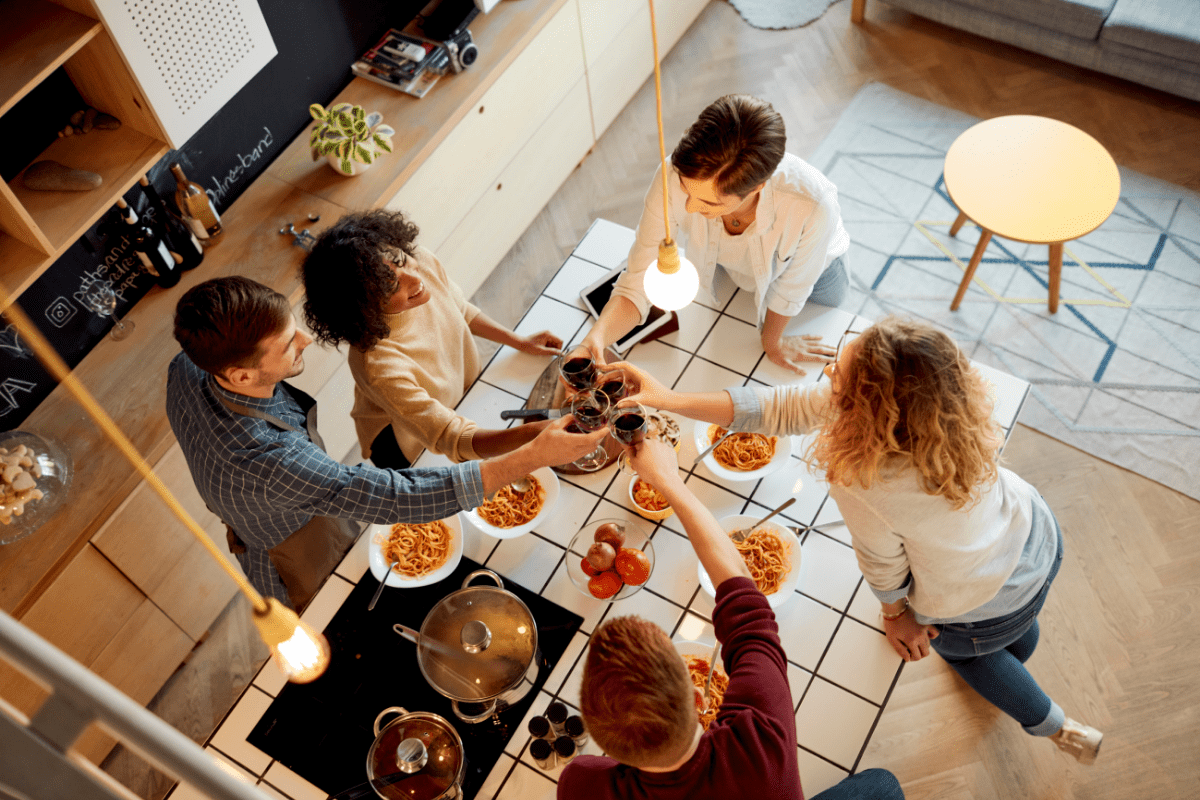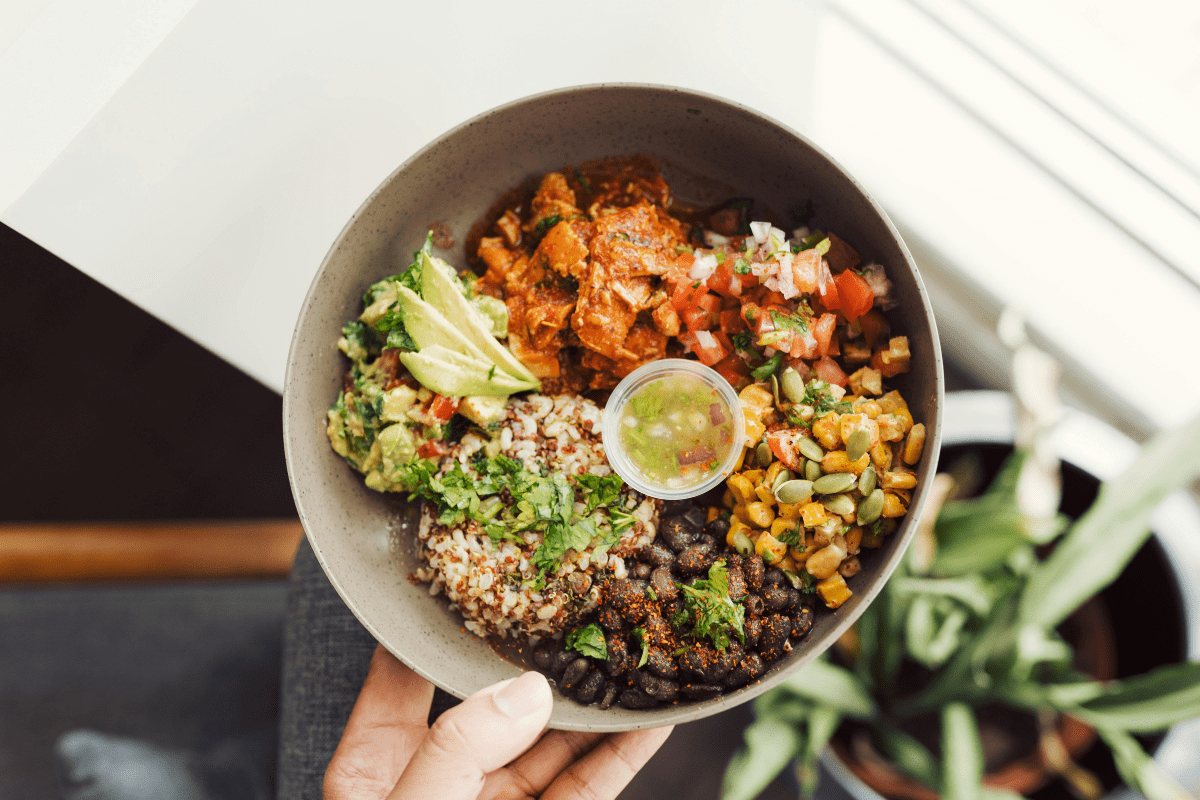Moving to a new city feels like being dropped into a giant social maze without a map. You're excited about fresh opportunities, but there's that nagging voice asking: "How the heck am I going to make friends here?" Don't worry… with the right strategies, you'll build meaningful connections faster than you think.
Start with the easiest wins first
Before you stress about meeting complete strangers at random coffee shops, let's talk about the friendship equivalent of picking low-hanging fruit. Your existing network is pure gold, even if those connections feel ancient or scattered.
The simplest move? Do a quick Facebook search for "friends who live in [your new city]." I guarantee you'll find at least one person you've lost touch with who's been living there for years. That college roommate's boyfriend who you barely knew? He might now be your gateway to an entire friend group.
LinkedIn works great for this too. Filter your professional network by location and see who's already established in your new city. These people understand the struggle of building connections from scratch and are often happy to help.
Reach out without being weird about it
The key is making your outreach feel natural and specific. Skip the generic "Hey, how are you?" message that screams mass text. Instead, try something like: "Hey Sarah! Just moved to Denver and remembered you live here. Would love to grab coffee and hear about your favorite neighborhoods. Free next week?"
This approach works because you're asking for their expertise about the city, not just randomly trying to revive a friendship. People love sharing their local knowledge, and it gives you both something concrete to talk about.
Don't forget to announce your move on social media either. Post a story or status about your relocation… you'd be surprised how many friends know someone in your new city. Sometimes the best connections come through these unexpected second-degree relationships.
Master conversation starters that actually work
Let's be honest: most conversation advice sounds like it was written by someone who's never felt awkward in their entire life. Real conversations don't start with "So, what's your story?" unless you're hosting a podcast.
The secret is asking questions that give people something easy and interesting to talk about. At events, try "What brought you here tonight?" This works whether you're at a professional mixer or a random Tuesday trivia night. It shows genuine interest and usually reveals shared connections or interests.
For everyday encounters, restaurant recommendations are your best friend. "What are your favorite spots around here?" works almost everywhere and gives you actual useful information. Plus, if they mention a place you've been wanting to try, boom… instant follow-up opportunity.
Keep conversations flowing naturally
Once you've broken the ice, the trick is asking follow-up questions that dig a little deeper. If someone mentions they love hiking, don't just nod and move on. Ask how they got into it, or what their favorite local trail is, or whether they prefer morning or afternoon hikes.
The best conversations happen when you share something related back. If they mention loving Thai food, mention that hole-in-the-wall place you discovered last week. If they're into rock climbing, admit you've always wanted to try it but are terrified of heights.
People remember conversations where they felt heard and where you contributed something genuine. It's not an interview… it's a mutual exchange of stories and interests.
Use apps that don't make you feel like you're speed dating
The friendship app game has seriously improved since the early days of awkward "friend dating." These platforms now feel less forced and more like natural ways to meet people with similar interests.
Bumble BFF uses the same swiping mechanism as dating apps, but specifically for platonic friendships. It feels familiar if you've used dating apps, and the interface makes it clear everyone's there for the same reason… no romantic confusion.
Meetup remains the gold standard for activity-based friendships. The beauty is that you're meeting people around shared interests, so conversation flows naturally. Plus, there's less pressure than one-on-one coffee dates.
Set up your profiles for success
Your profile should show your personality, not your resume. Instead of listing every hobby you've ever tried, focus on 2-3 things you're genuinely excited about right now. If you're obsessed with finding the best tacos in your new city, say that. If you're training for a half marathon, mention it.
Use recent photos that actually look like you. I know this sounds obvious, but friendship apps are full of people using photos from 2019. You want your new friends to recognize you when you meet in person.
When messaging matches, be specific about plans. "Want to grab coffee sometime?" often dies in message limbo. "There's a great coffee shop called Blue Bottle on Fifth Street… want to check it out Saturday morning?" gets responses.
Find your people in strategic locations
Not all social venues are created equal. The bar scene might work for some people, but if you're looking for deeper connections, you need places where people are already open to conversation and shared experiences.
Fitness communities are friendship goldmines. The gym might seem intimidating, but group fitness classes create instant camaraderie. Everyone's struggling through the same workout, which breaks down social barriers fast. Running clubs are especially welcoming… most accept all skill levels and meet regularly.
Volunteer work attracts people who care about making a difference, which often translates to being open to new friendships. VolunteerMatch can help you find opportunities that match your interests and schedule.
Don't overlook learning environments
Taking a class as an adult is like friendship bootcamp. Whether it's pottery, coding, or salsa dancing, you're all beginners learning something new together. The shared experience of being slightly terrible at something creates bonds quickly.
Language exchange groups are particularly great if you're in a diverse city. You help others practice English while learning their language… it's structured socializing with a clear purpose. Many cities have informal language cafes where people gather specifically for these exchanges.
Libraries often host events beyond book clubs. Check their community boards for everything from investment workshops to gardening clubs. These events attract locals who are genuinely interested in learning and connecting.
Turn one connection into many
The "snowball effect" is real when it comes to adult friendships. Once you have one solid connection, they become your gateway to their entire social circle. The key is being strategic about expanding these initial relationships.
Always say yes to group invitations, even when you're tired or would rather stay home. That random Tuesday board game night might introduce you to your future best friend. These gatherings are low-pressure ways to meet multiple people at once.
Host your own small gatherings
Once you've met 2-3 people through different channels, consider hosting something simple. It doesn't need to be elaborate… even "coffee and pastries at my place Sunday morning" works. Being the connector helps people see you as someone who brings others together.
Ask your new friends directly about expanding your circle. Most people are happy to help when you're honest about your situation. Try: "I'm still pretty new here and trying to meet more people. Do you have friends who might be up for joining us for trivia next week?"
Don't underestimate the power of being the organizer. When you consistently plan activities, people start thinking of you as the social coordinator, which naturally expands your network.
Navigate common friendship roadblocks
"I'm too busy" is the most common excuse for not making new friends, but it's usually about priorities, not time. Instead of adding friendship-building to your to-do list, integrate it into things you're already doing.
Join a gym near your office instead of one across town. Attend professional networking events in your industry… you're building career connections and potential friendships simultaneously. Choose hobby groups that meet on evenings or weekends when you're already free.
Introverts need different strategies
If large groups drain your energy, focus on apps and smaller, structured activities. Coffee meetups through friend apps feel less overwhelming than walking into a 30-person Meetup event. Classes work well because the activity provides natural conversation topics.
Remember that many people in your situation are also introverts looking for connections. You don't need to become a social butterfly… you just need to find your tribe of fellow thoughtful, quieter people.
The "everyone already has their friend groups" fear is mostly in your head. Life changes constantly… people move, get divorced, have kids, change careers. There are always others looking to expand their social circles, especially in cities with lots of transplants.
Convert casual meetings into real friendships
Meeting people is only half the battle. The difference between acquaintances and friends is consistent follow-through and gradually deepening conversations.
Follow the 48-hour rule: reach out within two days of meeting someone new. Reference something specific from your conversation and suggest a concrete next step. "Great meeting you at the pottery class! You mentioned loving that Vietnamese place on Main Street… want to check it out this weekend?"
Build connections through shared experiences
Real friendships develop through doing things together, not just talking. Suggest activities that create memories: trying a new restaurant, attending a local festival, or exploring a neighborhood neither of you knows well.
Be vulnerable gradually. Share personal stories about your move, your career change, or your weekend disasters. When someone trusts you with their own stories, reciprocate with something equally personal. This mutual sharing is how acquaintanceships become friendships.
Show up consistently. In new friendships, reliability matters more than being the most fun person in the room. If you say you'll be somewhere, be there. If you promise to send that article you mentioned, actually send it.
Set realistic timeline expectations
Building meaningful adult friendships takes time… usually 6-12 months to develop truly close connections. This isn't because you're doing anything wrong; it's just how relationship building works when everyone has busy lives and existing commitments.
Month one should focus on getting oriented and making initial connections. Download apps, join groups, attend events. You're not expecting best friends yet… you're just getting yourself out there.
Months two through four are about deepening promising connections while continuing to meet new people. You might have regular coffee dates with 2-3 people and be exploring different social activities.
Create your 30-day action plan
Week one: Set up your digital presence. Download friend apps, join local Facebook groups, research Meetup events in your area. Pick one regular activity to start, like a weekly yoga class or gym membership.
Week two: Attend your first event or meetup. Start three conversations with new people. Follow up with anyone you connected with using the 48-hour rule.
Week three: Try a different type of social activity. Maybe you tried a professional networking event last week… this week, try a hobby-based group. Invite someone for coffee or lunch.
Week four: Attend a second event and host something small, even if it's just coffee for two people. Evaluate what's working and adjust your approach for month two.
The bottom line on making friends as an adult
The hardest part about making friends in a new city isn't finding people… it's putting yourself out there consistently when you'd rather order takeout and watch Netflix. But here's the thing: everyone you'll meet has been new somewhere at some point. Most people are more open to new friendships than you think.
Your new city is full of potential friends who share your interests, your sense of humor, and your desire for genuine connection. The key is combining multiple approaches: leveraging your existing network, using modern tools strategically, and engaging in activities you actually enjoy.
Start with one method that feels comfortable this week. Maybe it's reaching out to that college friend who lives across town, or downloading Bumble BFF, or signing up for that pottery class you've been eyeing. Pick something specific, set a small goal, and take that first step toward building the social life that'll make your new city feel like home.




